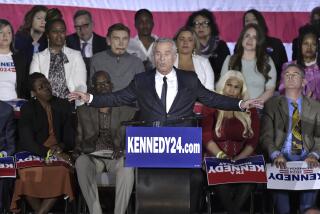Crisis of ’62 Calls to Bush
- Share via
In October 1962, as the United States was poised to invade Cuba to remove the medium-range ballistic missiles from that island, Soviet Premier Nikita Khrushchev offered to remove the Soviet missiles if the U.S. removed its missiles from Turkey and agreed not to try to overthrow Fidel Castro by force.
Many members of President John F. Kennedy’s national security team, including the military chiefs and conservatives in Congress, argued that this was merely a delaying tactic, that the Russians could not be trusted and that the president should allow the invasion to go forward and solve the Cuban problem once and for all.
Indeed, in his campaign for the White House, Kennedy had said he was not comfortable with the U.S. having an enemy 90 miles off its coastline, and, in the spring of 1961, he had allowed the Bay of Pigs operation to proceed.
Kennedy correctly understood that his objective was not the removal of Castro but the removal of the missiles. While it would certainly have enhanced U.S. security to remove a Soviet outpost in our hemisphere, the risks of doing so far outweighed the potential benefits.
As it turned out, Kennedy was correct. We now know that if the invasion had gone forward, nuclear-tipped Soviet missiles would have been launched against the U.S. because the Soviet leadership in Moscow had delegated the authority to fire the missiles to their on-scene commander in Cuba. We also know that a nuclear missile attack on the U.S. would surely have led to a U.S. retaliatory attack on the Soviet Union, a Soviet response and a nuclear holocaust that would have devastated the planet. Moreover, Kennedy did not suffer politically when the concessions he made to the Soviets became public.
For three decades after the Cuban missile crisis, Castro continued to cause problems for the U.S. Cuba remained a military outpost in the Western Hemisphere for Soviet military forces, and Castro himself aided and abetted communist insurgencies in South and Central America. But, in the end, with the collapse of the Soviet empire, Castro became an anachronism.
With Iraqi President Saddam Hussein’s offer to allow inspectors back into Iraq without conditions, President Bush has been placed in a situation similar to that of Kennedy. The question is whether he will show the same amount of prudence as Kennedy, or will he allow the opinions of his advisors or his own previous statements to dictate his course of action.
There is no doubt that Bush and many of his key advisors would like to remove Hussein and that the world would be a better place without the Iraqi leader. Indeed, Bush has been talking about regime change in Iraq for the better part of the year. But should his objective be the removal of Hussein or his weapons? If inspections can achieve the latter objective, is it worth the risk of what might happen if an attack is launched against Iraq?
As Brent Scowcroft and others have written, carrying out such an attack could lead to the use of weapons of mass destruction and an Armageddon in the Middle East and the Persian Gulf.
Allowing the inspectors to return to Iraq will not be easy for Bush. His vice president and his secretary of Defense have dismissed the inspections as useless. His conservative base was not pleased with his approach to the United Nations. Even a successful inspections regime would probably leave Hussein in power. But if the inspections work, the U.S. will achieve its primary objective and, just as we learned to live with Khrushchev and his successors and with Castro, we can learn to live with Hussein.
Moreover, if Hussein does not cooperate with the inspectors, Bush will have world support for going after him--something that will diminish the risks of the situation getting out of hand.
More to Read
Sign up for Essential California
The most important California stories and recommendations in your inbox every morning.
You may occasionally receive promotional content from the Los Angeles Times.













